|Australia home|
|Sydney, Blue Mts|
|Fraser Island|
|diving Great Barrier Reef|
|Litchfield & Kakadu|
|Singapore|
Click on one of the links above (or in the map)
for more details on any particular area we visited. On this
page, you'll find the following (links within this page):
Description of our four-day drive
from Rockhampton (Queensland) to Batchelor (Northern Territory).
"Welcome to the Isa, you're a real Aussie now";
Mount Isa is bizarre!!.
Where we stayed, caravan parks.
Photographs - a little larger than
the ones you see in the description of the trip. (I put the
photographs at the end of this page, so they'll load as you read.)
Description of our drive
Most people fly from the east coast (eg. Cairns) to Darwin, but that way they miss the crazy Outback! The Outback is absurd, it's bizarre, and if you're into that, you don't want to miss it. For one, there's absolutely nothing there to see, and it really takes several days to see that that is indeed the case. When you start off, you expect a town beyond every
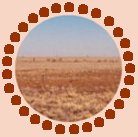 hill; when you near the end, you don't expect the desert ever to end. And then there's the people. If four days in the Outback was enough to lull us into a trance, try to imagine people who actually live there. If all of this arouses your curiosity - and it should! - then by all means read on.
hill; when you near the end, you don't expect the desert ever to end. And then there's the people. If four days in the Outback was enough to lull us into a trance, try to imagine people who actually live there. If all of this arouses your curiosity - and it should! - then by all means read on.
Tuesday, september 10th, 2002.
Today, we drove from Bundaberg to Rockhampton, along the east coast of Queensland. Keeping the campervan in the middle of the road with the gusts of wind was enough to keep us sharp, but judging from the signs along the road, this doesn't hold for everybody; Queensland appears to be trying to keep its drivers awake. A few of our favorites: "Rest or R.I.P," "Stop, Revive, Survive," "Brake the Drive, Stay Alive," and "Survive this Drive." It sure makes driving along these deserted roads sound like a challenge!
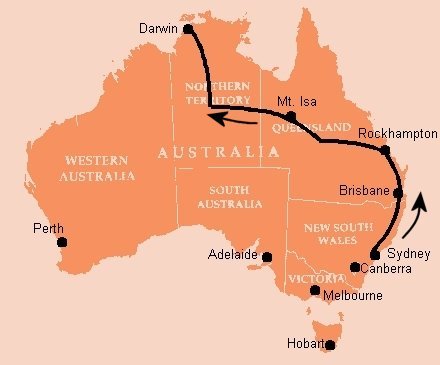
Wednesday, september 11th, 2002.
There are only a few major roads away from the coast, in northeastern Australia (or in the rest of the continent, for that 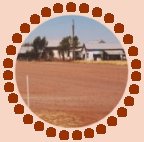 matter). There's the Stuart Highway, which runs north-south smack through the middle of the outback, and through Alice Springs. More relevant for us, there's also an east-west highway, the Barkly Highway, with the Capricorn Highway leading off it. We drove from Rockhampton to the northwest along Capricorn Highway.
matter). There's the Stuart Highway, which runs north-south smack through the middle of the outback, and through Alice Springs. More relevant for us, there's also an east-west highway, the Barkly Highway, with the Capricorn Highway leading off it. We drove from Rockhampton to the northwest along Capricorn Highway.
As we drove westward from Rockhampton, our fantastic two-lane "highway" (that's one lane in each direction) passed towns, then villages, and finally just hamlets consisting of a gas station and a few houses (probably belonging to the gas station owner, his parents, and someone who passed by and couldn't afford the gas to get out of there). There was a very strong headwind, and our campervan turned out to be surprisingly sensitive to wind: we couldn't get the speed above 100 km/hr.
The landscape started out pretty hilly - the Great Dividing Range - but soon went almost entirely flat. The eucalyptus forests disappeared gradually, and were replaced by yellow grass. We also got a fairly good impression of the local animal
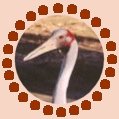 kingdom, even though this was in a pretty horrible way. There's a metal grille in front of our windscreen, to keep bouncing rocks from breaking it. As we drove, hundreds of butterflies were swept onto this grille, and were pinned to it, so that we had ample time to study them. Through the grille, and the flapping butterfly wings, we saw thousands of other roadside casualties: kangaroos and wombats. The wombats were occasional, but I swear that there was a dead kangaroo beside the road every one hundred meters, I checked the odometer. It was awful. I now also understand why people are advised not to drive at dusk or dawn, or at night. We won't.
kingdom, even though this was in a pretty horrible way. There's a metal grille in front of our windscreen, to keep bouncing rocks from breaking it. As we drove, hundreds of butterflies were swept onto this grille, and were pinned to it, so that we had ample time to study them. Through the grille, and the flapping butterfly wings, we saw thousands of other roadside casualties: kangaroos and wombats. The wombats were occasional, but I swear that there was a dead kangaroo beside the road every one hundred meters, I checked the odometer. It was awful. I now also understand why people are advised not to drive at dusk or dawn, or at night. We won't.
We spent the night "dry camping" on a parking lot near Longreach. I was hoping to actually see a live kangaroo, in the wild, and figured we'd have a much better chance outside of town. I was right! At dusk, I spotted a huge pear with paws and ears emerging out of the shadows. I must have scared it off, as it hopped down the road, away from me. Yeah, a kangaroo! Dry camping is very easy with a campervan, as you have a tank full of water, and even a refrigerator and a stove. No problem there. The cool desert night was pleasant after last weeks' heat, and we enjoyed countless stars overhead.
Thursday, september 12th, 2002.
We drove through an incredibly empty area today. There was so little traffic that all drivers wave at each other - how
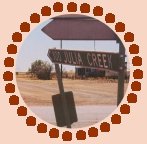 cute! While driving, I amused myself by driving on the right side of the highway for a while (that's the wrong side in Australia), and did a zig-zagging game with the white lines down the road - that's just to give you an impression of the amount of traffic.
cute! While driving, I amused myself by driving on the right side of the highway for a while (that's the wrong side in Australia), and did a zig-zagging game with the white lines down the road - that's just to give you an impression of the amount of traffic.
Close to noon, and about 40 km from the nearest town, we were stopped by a police road-block. Surprisingly, Eric (the driver at that time) had to do a breath analysis test, for alcohol! When we asked the police officer why on earth they'd do an alcohol test in the middle of nowhere, and around noon, he sighed and muttered "not much else to do around here." I'm not sure whether he was talking about drinking, or about carrying out alcohol tests... It was odd.
Speaking of "things to do," we had picked up a tourist newspaper somewhere that listed just that for the Outback Queensland area. Judging from the thickness of the paper, there's absolutely no shortage of exciting activities. One of our favorite pages lists what to do in the town of Quilpie:
Go fishing
Identify street names: "You'll notice that most of the streets in Quilpie are named after birds..."
Walk by the river
Why on earth would a person want to drink?
In the early afternoon we reached Cloncurry, and visited the John Flynn House, a small museum about the guy who started the Flying Doctors. It all started out as preachers travelling around the Outback by camel, to spread Christianity. After a while, they recognized the need for medical rather than religious help in the Outback, and nurses started to travel with them. Then John Flynn met the founder of QANTAS, who got him a suitable plane (it would have to fit a stretcher, and be able to land on rough ground), and from then on they were the Flying Doctors (from what I understood, anyway).
All day, we'd seen the signs and postcards proclaiming "You're not a real Aussie 'til you've been to the Isa," so I can't deny that we were getting pretty excited by the time the smokestacks of Mount Isa appeared on the horizon. And even Eric and I felt a surge of pride, and grinned happily at each other, when we passed the "Welcome to the Isa, you're a real Aussie now!" sign at the city limits. This was gonna be something! It was late afternoon, and we found ourselves a nice camping spot next to a river. Too bad it's a dry river bed about 360 days a year (including today), but hey. As soon as we were set up, we walked to the center of town, hardly able to contain our excitement.
Mount Isa exists by the grace of the MIM, or Mount Isa Mines. Despite the feminine name, it's a very masculine town, where everything reminds you of the strong, hardy miners, who work hard and get blasted at night. Stores are of a no-nonsense kind, such as Mansworld (hardware and tools), and Total Work Wear (probably mine attire), and are alternated with piercing and tattooing salons. I doubt Yves Saint Laurant should open a store here. The people are a little odd, too: we saw dozens of incredibly drunk men, sometimes just yelling out of bars, or yelling at each other across the street. There were also several who had fallen over drunk, and were lying stretched out on the sidewalk, still yelling at each other. The bars we peered into all looked the same: a bare, empty room, with whitewashed walls, a row of stools at the counter, a pool table, and a harsh, blue light overhead. That wouldn't have been so bad if the stools hadn't been occupied by silent drunken men who all raised their heads and gazed at us standing in the doorway. Even though it was hard to resist the inviting atmosphere in these bars, we decided to skip pre-dinner drinks and started looking for a place to eat.
Mount Isa has a choice of fine restaurants. Unfortunately, the Pizza Hut and KFC were take-away only. We could have chosen to eat our dinner on the sidewalk, in the company of the wasted and yelling drunks, but we decided to look a little further. The only other places we found were McDonalds, and a place called the Carpentaria Buffalo Club, or the Buffs, so logic directed us to the latter.
Apparently, the Buffs is trying to hold onto an oasis of decency in the Isa; upon entry, we were politely refused entrance to the restaurant, as Eric's shirt did not have a collar. We were, however, allowed to sit in the cafe. Luckily, we found a workaround: when we asked the friendly cafe waitress for food, and explained our situation, she looked us over, glanced around, and pointed at a double row of slot machines. If we'd just steal through there, and take a left at the very end, we'd bypass the collar-checkpoint at the restaurant entrance. We thanked her profusely, and a few moments later we were standing in line for the buffet.
As we looked at the food behind the counters, and listened to a live country-singer on stage, a most surprising thing happened. We heard a sudden low rumbling, and then the earth shook beneath our feet. The glass panes in the counters rattled, and we saw signs on the walls swaying ever so slightly. It didn't last for more than a few seconds. Eric and I gaped at each other with eyes wide with shock, grabbed for each other's hand in a slight panic, and then looked around wildly. And that's when we noticed the amazing part: nobody else in the entire room even so much as blinked. Conversations hadn't even been interrupted, forks had not paused in mid-air, and the servant behind the counter was pleasantly ladling soup. There hadn't been a hitch in the country-singer's love-song. It was totally unreal.
Trying to compose myself, I cleared my throat and turned to the man standing in line behind me. "What was that?" was all I managed. The man's first reaction was a surprised look, as if he had no idea of what I might be referring to, and then he answered, "Oh, that, that's the mines." He paused, and, realizing that I had no idea what he was talking about, he added, "It's the mines, they always have explosions at 7:55, in the underground tunnels. You can feel it all over town." "You mean they do this every day?" I was amazed. "Oh, twice a day, actually," the man answered, "at 7:55 in the morning and evening. The morning one will sometimes wake you." You know what, this place is bizarre. We gave up trying to understand, and decided to blend in: after dinner, Eric and I drank a lot of beer, yelled on the sidewalk for a while, and then took the Buff's courtesy bus back to our campervan.
Friday, september 13th, 2002.
We'd been warned about the road quality west of Mount Isa, but had waved it away as just retirees' worries. However, they were right: the road quality deteriorated until it reached its all-time low, with only one frayed lane.
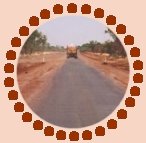 Overtaking was out of the question, and if there was an oncoming car, both went halfway off the road, to pass each other. If the oncoming traffic happened to be a roadtrain, however, it barreled right down the center of the road, and the other cars pulled off into the gravel and came to a stop. Apparently, the road quality in this area is so poor because of regular flooding. I've also heard that travellers can get stranded here for weeks, if the area is flooded, so you really shouldn't plan on crossing this area in the wet season.
Overtaking was out of the question, and if there was an oncoming car, both went halfway off the road, to pass each other. If the oncoming traffic happened to be a roadtrain, however, it barreled right down the center of the road, and the other cars pulled off into the gravel and came to a stop. Apparently, the road quality in this area is so poor because of regular flooding. I've also heard that travellers can get stranded here for weeks, if the area is flooded, so you really shouldn't plan on crossing this area in the wet season.
We crossed the border into the Northern Territory just west of Camooweal, and set back our watches half an hour - we love this pig-headedness! However, the road quality improved immensely right away, and we finally had the chance to cover some ground. We had filled the campervan tank with gas at Camooweal, but were very grateful to finally reach Barkly Homestead, with the next gas station. The distance between these two was about 300 km, and we found out that that's just about our campervan's reach on one tank of gas. We were prepared for this, however: we'd filled a jerry can with gas, and had it in the rear of our campervan. This is against the rental agency's rules (because of the danger of explosion in a traffic accident) but we were not willing to run the risk of stranding in the Outback.
Let me just stress this: along the Barkly Highway, roadhouses or homesteads are 300 km apart. Keep this in mind if you're going to be driving here. And although we understand the attraction of long-distance cycling (we cycled from the
Netherlands to Spain), you might want to reconsider if you're thinking of
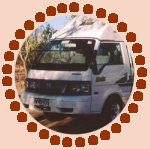 cycling through the Outback. We met two guys who were cycling through Australia, straight through the Outback, and they suffered. You have to realize that you're going to be cycling alongside a very narrow strip of asphalt ("bitumen" in Australia), dotted with kangaroo carcasses in various states of decay. Road trains will be passing you all the time, pushing you into the rough gravel, and stirring up enormous clouds of red dust in their wakes. It'll be very, very hot, and you'll have to carry enough water to last you for 300 km. Just make sure you know what you're getting into.
cycling through the Outback. We met two guys who were cycling through Australia, straight through the Outback, and they suffered. You have to realize that you're going to be cycling alongside a very narrow strip of asphalt ("bitumen" in Australia), dotted with kangaroo carcasses in various states of decay. Road trains will be passing you all the time, pushing you into the rough gravel, and stirring up enormous clouds of red dust in their wakes. It'll be very, very hot, and you'll have to carry enough water to last you for 300 km. Just make sure you know what you're getting into.
Somewhere in the afternoon, we took a right turn, and headed north onto Stuart Highway. We stopped at Renner Springs Roadhouse, and spent a very pleasant evening talking to the bartender/campground owner/gas station owner/motel owner, and two truckdrivers, discussing the joys of being a truckdriver in the Outback.
Saturday, september 14th, 2002.
We moved into a completely different environment today. I could have sworn that we only saw dry land, with occasional wiry shrubs, today. However, when we stepped out of our campervan in Batchelor, we somehow found ourselves in something resembling a tropical rainforest. I don't know when the actual change occurred, we never noticed. That's probably a sign that we've been in the Outback for about long enough now. The difference was shocking: after the dry, bakey heat of the Outback, we now found ourselves in a warm and humid environment, with green palm trees and colorful birds all around.
We had dinner, and a drink, in a bistro close to our campground. When I returned from a trip to the restroom, I just caught sight of a shadow darting away from my bar stool. As I sat down, Eric grinned at me and said a woman had just tried to hit on him. Just then, an old woman who'd been sitting a little further down slipped off her bar stool and came over. She stood next to us, cast a glance at Eric, and then warned me that somebody had been flirting with "my husband." Oh dear. I thanked her for the warning, and she returned to her seat. Now what was this all about? As it turned out, it was very sad, really. The woman was probably about my age, had no teeth, and had sidled up to Eric, telling him he looked mighty good tonight, and then asking him for a drink. She had been pretty drunk already. He had thanked her for the compliment, but refused.
This, then, is clearly the down side of the Australian Outback, and the Top End. The woman was basically begging for alcohol. An elderly couple gave her something to eat, and eventually the bartender shooed her out of the bistro. It seems as if a large number of people in this region flee from reality through alcohol abuse, and I'm afraid that relatively many of them appear to be of Aboriginal origin. I feel for these people, and believe that a huge wrong has been done to them. How can you right such a wrong? This is a problem that the Australian people are already trying to adress for a while now, and I hope they can work it out.
In rereading what I wrote, I fear that people may get the wrong impression that we did not like the Outback. I do sound a little sarcastic here and there. But the truth is that we had a great time here, and that we found most of the weird things highly amusing, rather than problematic. This area is not exactly the most welcoming one for humans to live in, and living here is not without its challenges, but we're impressed with the ways in which people still succeed in surviving here. The people were overwhelmingly friendly, and the landscapes really are beautiful. I confess that I don't think I'd like to live here, but it was definitely worth driving through, just to experience a "frontier" kind of sensation. I'd love to visit here again.
The next morning we visited Litchfield National Park.
Where we stayed
Bundaberg: Finemore Caravan Park - convenient location close to downtown
Rockhampton: Wanderer Caravan Park - good
Longreach: "dry" (wild) camping
Mount Isa: Riverside Caravan Park - good, with pool
Renner Springs: Renner Springs Roadhouse (you can hook up your campervan there,
facilities are basic)
Batchelor: Caravillage Caravan Park - good
Photographs of Australia's
Outback
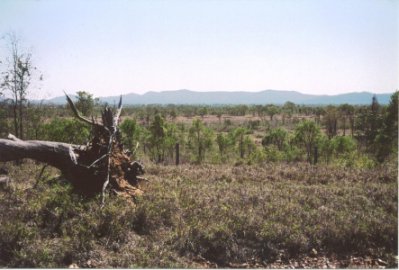
The green landscape in eastern Queensland, near the coast.
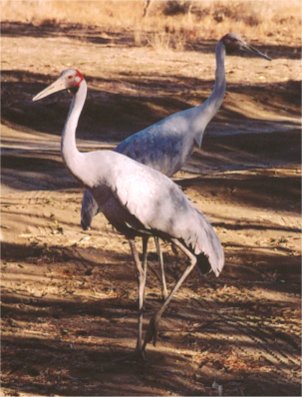
Brolgas checking out our dry-camping area.
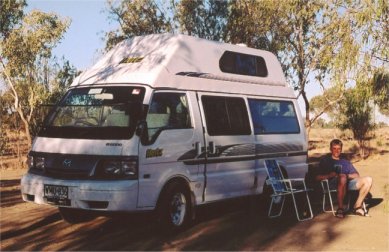
Our campervan (dry-camping).
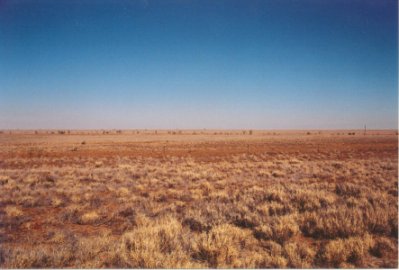
The dry, red Outback.
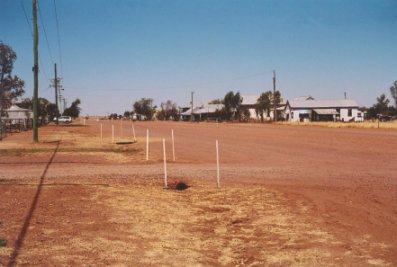
Center of town, in an Outback village. Quite a challenge to
cross the road!
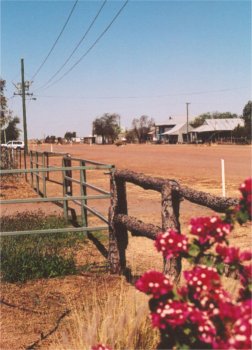
Outback village.
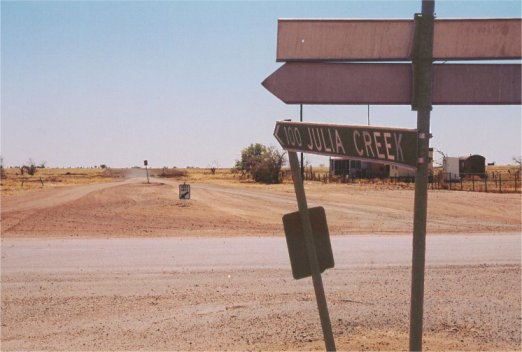
Just 100 km of unsealed road to the Julia Creek metropolitan
area...
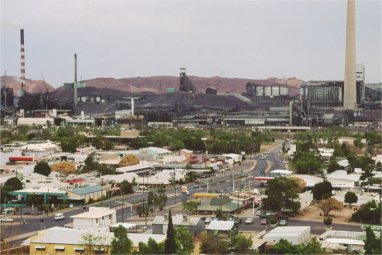
Beautiful Mount Isa (mines in the background).
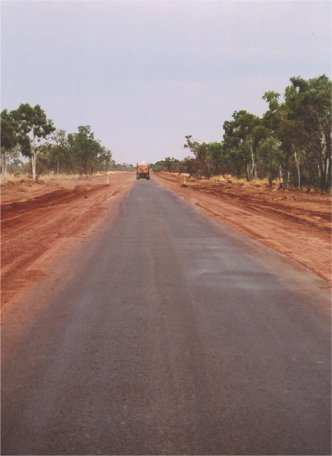
Great road quality near Camooweal. This is one of Australia's
main highways, but in the Outback. Note that the truck in the
distance is nearly as wide as the road.
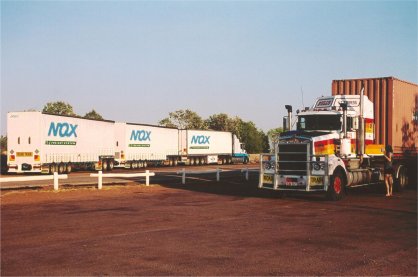
Road trains. You don't want to challenge these.
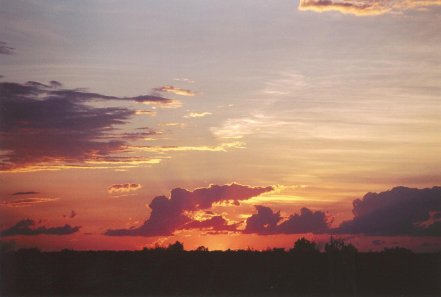
The Outback has gorgeous sunsets.
|Judith home|
|Canada|
|Portugal & Spain|
|Sweden|
|Nepal|
|cycling Holland to Spain|
|
email me|
|


